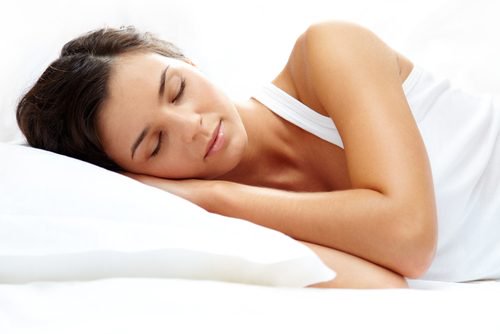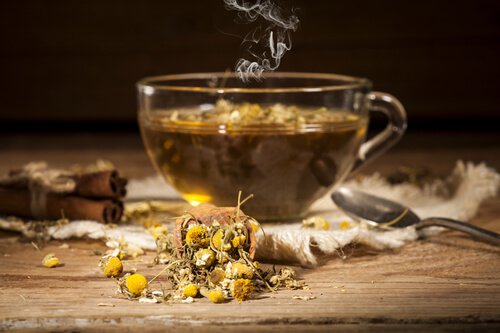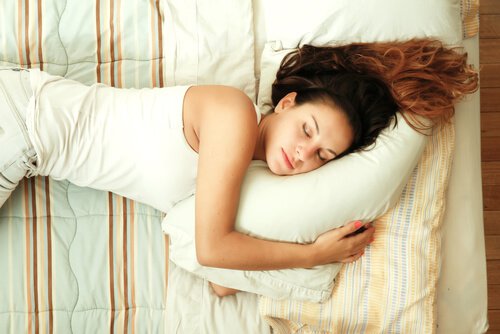Six Natural Drinks to Help You Sleep Better

A good night’s sleep is essential for a healthy life. However, insomnia is a common disorder that can appear at any moment in our lives as a result of stress.
Ideally, you want to get an average of 8 hours of sleep each night. Although sleeping pills can help you get a better night’s rest, you want to use them as little as possible.
Our recommendation is that you always choose natural drinks.
Luckily, various alternatives exist for getting a better night’s sleep that will do more than just help you relax. They will regulate your body and help you stay asleep the entire night.
1. Chamomile Tea
Chamomile tea is a relaxing and calming tea that contributes to a reduction in anxiety. A Chinese study showed that it even helped new mothers to sleep better and fight post-natal depression more efficiently. To help you sleep better just drink a cup of this tea, preferably warm.

Ingredients
- tablespoon of chamomile (10 g)
- 1 cup of water (250 ml)
Preparation
- Bring the water to a boil and when it reaches its boiling point, add the chamomile.
- Let it stand five minutes, strain, and then drink it.
- If you want, you can sweeten it with a little honey.
Chamomile is not only a useful home remedy for insomnia. It is also an excellent natural treatment for digestive problems, something that can also affect your quality and amount of sleep.
You might want to read: Easy, Useful, and Natural Chamomile Remedies
2. Valerian
This plant is very useful for fighting insomnia; it helps you get a deep sleep and you will fall asleep faster.
Because of its properties, valerian can be an energizer if taken during the day, or a relaxer if taken before bed.
Ingredients
- 1 cup of hot water (250 ml)
- 1 teaspoon of valerian (5 g)
Preparation
- Add the valerian to boiling water and let sit a few minutes
- Strain and then drink immediately
3. Lemon Balm
Also known as Melissa, lemon balm is very beneficial as a natural treatment for better sleep thanks to its hypnotic properties. Although you can take 2 to 3 glasses a day, beware if you are pregnant or lactating. In that case, you should avoid this tea.
Ingredients
- 1 teaspoon of lemon balm (5 g)
- 1 cup of water (250 ml)
Preparation
- Bring the water to a boil and when it starts boiling, add the lemon balm
- Take off the flame and let sit for 5 minutes. Strain.
4. Cherry juice
Cherry juice is a natural source of melatonin, the hormone that regulates your sleep cycle. Several studies have found a positive effect between drinking cherry juice and sleep quality. Thus, to sleep better and to have a more restful sleep, we recommend that you drink a half cup (100 ml) of cherry juice in the morning and again at night.
This will help you fall asleep faster and stay asleep longer. Although this juice has not been associated with any negative side effects, we recommend that you do not drink more than one glass a day.
This is because it contains a high level of sugar and can cause a change in your glucose levels.
While if you are already an active person, the amount of sugar may not be a problem, it is still best to not exceed one glass a day.
5. Lavender Tea
Lavender Tea stimulates relaxation as well as reduces blood pressure and heart rate.
These three characteristics make it one of the best naturals drinks for a better night’s sleep. We recommend you drink it a half hour before you wish to go to bed.

Ingredients
- 1 tablespoon of fresh or dried lavender (10 g)
- 2 cups of water (500 ml)
Preparation
- Heat the water to a boil, then turn off the flame and add the lavender
- Let sit for 5 minutes and strain
- Drink while it is warm
6. Coconut water
Coconut water will help you fall asleep much faster. We recommend you drink one glass (200 ml) of coconut water one hour before you go to bed.
This drink is ideal for fighting stress-induced insomnia as well as insomnia due to unhealthy foods. Try to only buy coconut water that does not have preservatives.
You might also like: 8 Awesome Benefits of Coconut Water
General Advice for better sleep
Try to sleep at least 6 consecutive hours a night. Although this number can vary according to your activities and necessities, it is important to complete a full sleep cycle each day.

Not sleeping a sufficient amount produces cortisol in the body, which can increase stress levels. Also, getting too little sleep increases one’s resistance to insulin which can increase your possibility of developing diabetes or other problems controlling it you already suffer from it.
- Create a relaxing environment. Your room should be calming and give you a sense of peace. Ensure that the room is at a comfortable temperature and that there isn’t any noise.
- Sleep in comfortable clothing. Clothing made of cotton, that is soft and light, is the most ideal for sleeping. If the weather requires heavier fabrics, you can use them as well, but try to avoid being uncomfortable at all costs.
- If your daily routine impedes your ability to get complete a full sleep cycle, try to make up for your lost hours of sleep. This will also help to eliminate under-eye bags and tiredness.
- Eliminate caffeine, sodas, and fats two hours before going to bed. When you consume these products, you become more alert and will have more problems falling asleep.
- It is important to eat dinners that include vegetables, lean meats and a piece of fruit. Also, if you add one of the above drinks to your dinner, sleeping better will be very easy.
All cited sources were thoroughly reviewed by our team to ensure their quality, reliability, currency, and validity. The bibliography of this article was considered reliable and of academic or scientific accuracy.
- Vera, A. (2010). Dormir Bien. Consejo Editorial de Educación Pública Del Royal College of Psychiatrists. https://doi.org/10.1517/13543784.7.5.803
- Montserrat Galaa, A. M., & Fortes del Valleb, M. A. (2013). Aprender a dormir. Pediatria de Atencion Primaria. https://doi.org/10.4321/S1139-76322013000500004
- Chóliz, M. (1999). Sueño, activacion y trastornos del sueño. Universidad de Psicologia UV. https://doi.org/10.1093/mollus/60.1.47
- Labrador, D. (2011). La importancia de dormir bien para aprender. Discapnet.
This text is provided for informational purposes only and does not replace consultation with a professional. If in doubt, consult your specialist.








